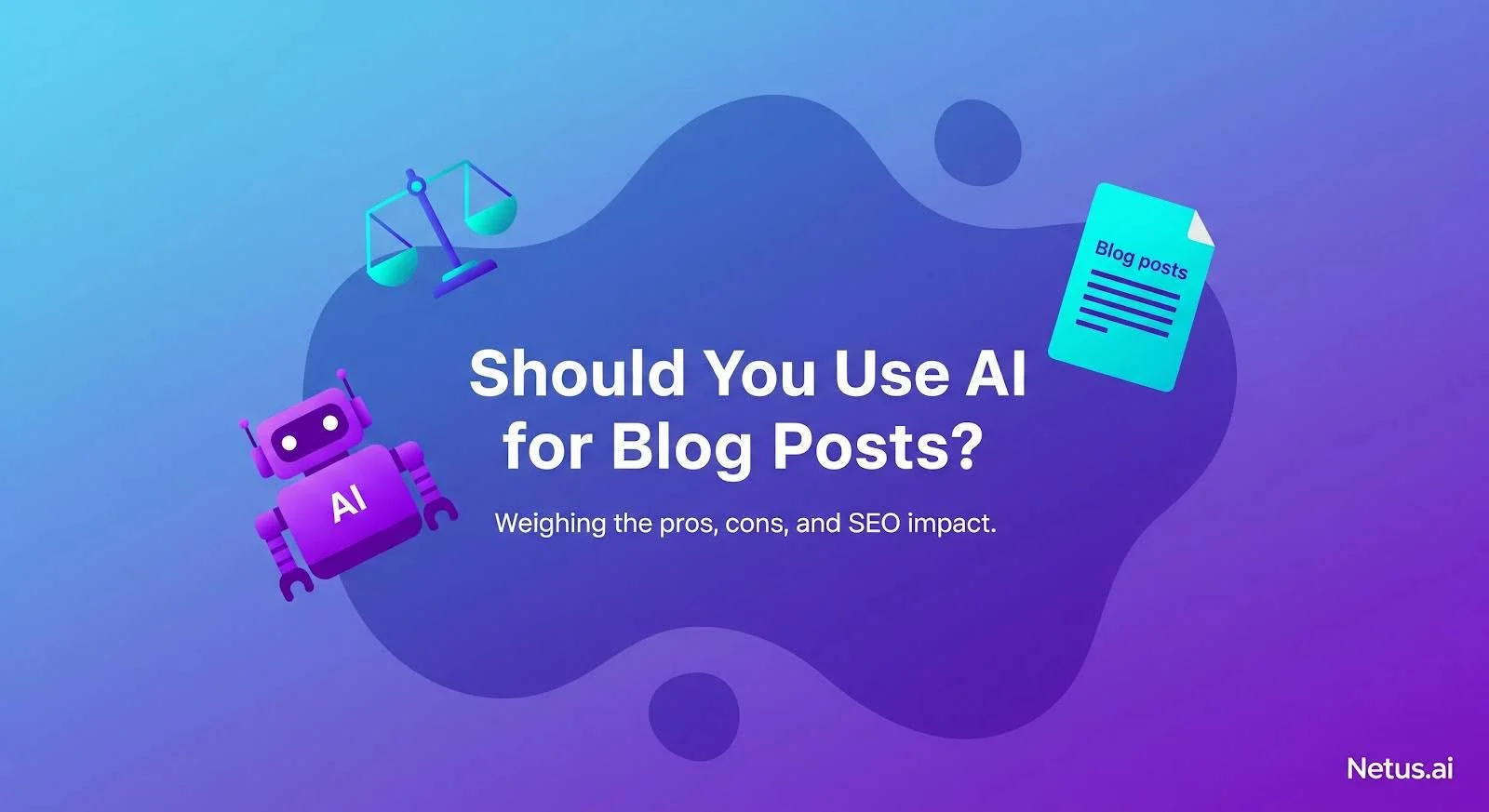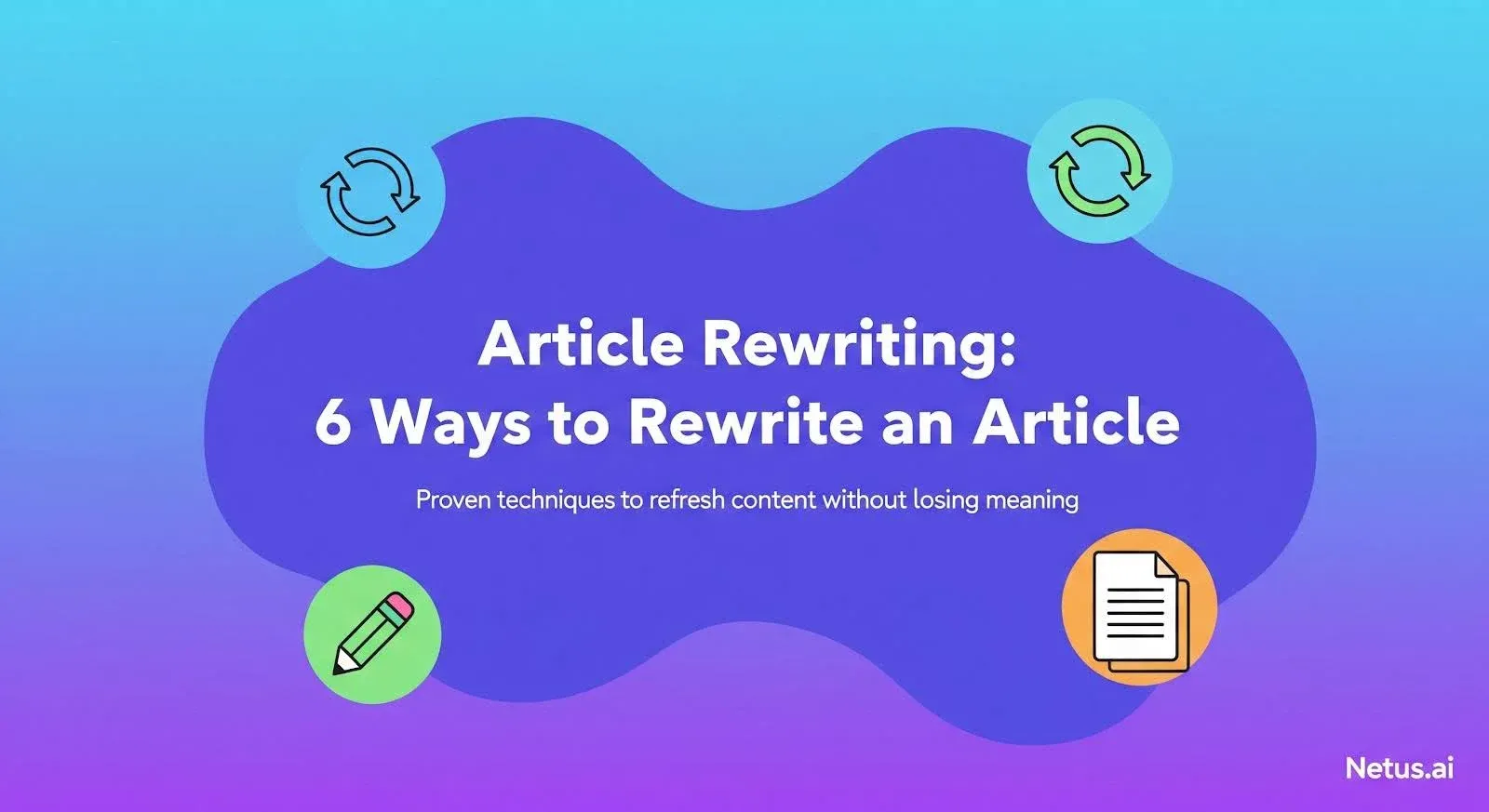Tools like ChatGPT, Claude and Gemini have completely reshaped how content gets created.
For marketers, bloggers and content teams, this speed is tempting. Why spend hours crafting a blog post when you can prompt an AI and get a 1,000-word draft in minutes?
But here’s the catch: not all AI-generated content is publish-ready and blindly relying on it can do more harm than good. Google’s algorithm is evolving, readers are more discerning and AI detectors are smarter than ever.
Pros of Using AI for Blogging
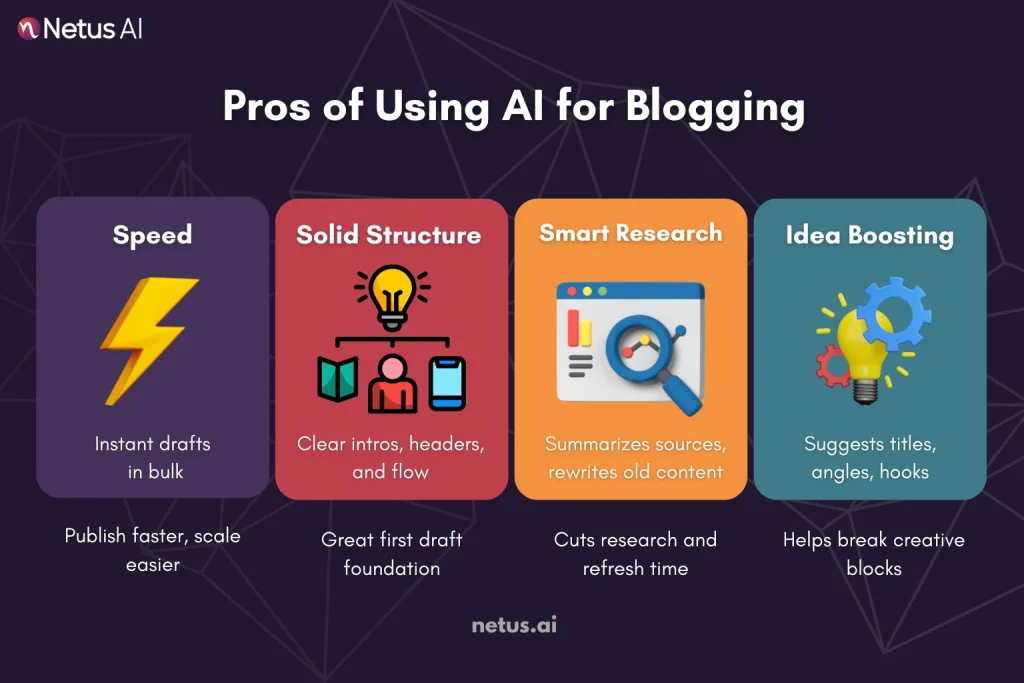
AI writing tools aren’t just hype, they solve real problems, especially for teams under pressure to scale content.
Speed and Volume
AI tools can draft thousands of words in minutes. This allows content marketers to move faster, explore more ideas and hit tight publishing deadlines.
Structure and Flow
Even first drafts are often logically structured, with headings, intros and conclusions that follow blog best practices. It’s a solid starting point, especially for outlining.
Research Efficiency
Some tools summarize sources, generate meta descriptions or rewrite old content, saving time across the content lifecycle.
Idea Generation
Struggling with writer’s block? AI can suggest blog titles, hooks or angles you might not have considered, giving your creative process a boost.
How to Use AI the Right Way? (Without Getting Penalized)
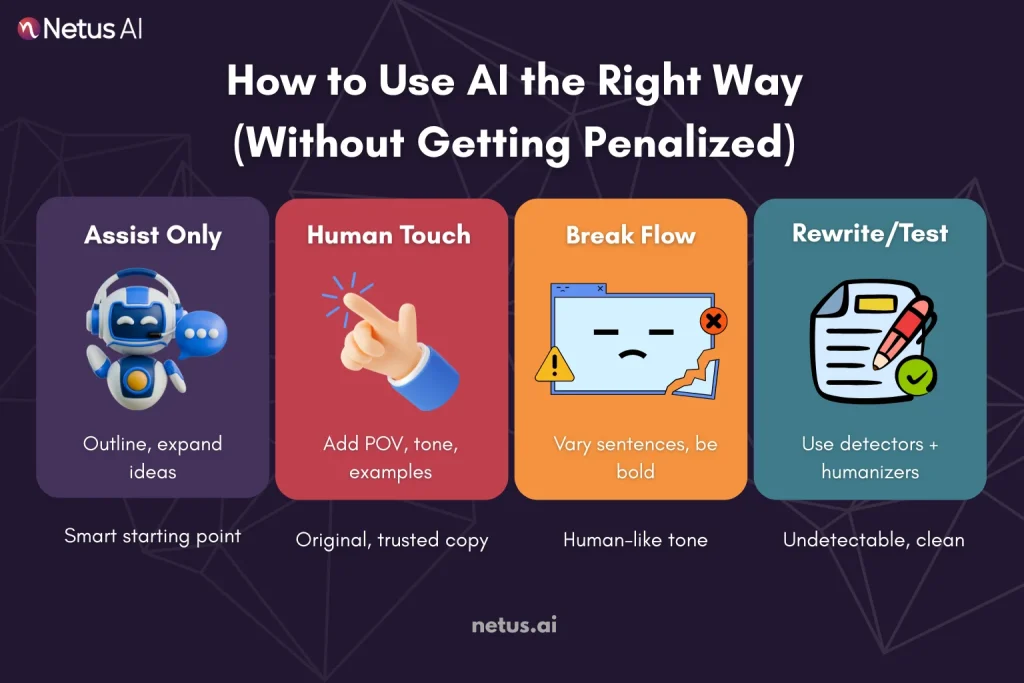
AI can accelerate your content workflow, but only when used strategically. Think of it as a rough draft generator, not a publish button.
Here’s how professionals are using AI without hurting their rankings:
Treat AI Like a Research Assistant
Use it to explore structure, expand on bullet points or brainstorm variations, not to write your blog word-for-word.
Inject Originality
Edit heavily. Add your personal experience, brand POV and examples. This breaks pattern detection and adds trust-building value.
Break the AI Voice
AI content often sounds robotic and uses safe transitions. To improve it, vary sentence structure, add informal connectors, bold statements or questions and avoid overused phrases.
Use Humanizing Tools
Even if your AI draft “sounds okay,” it might still get flagged. That’s where smart rewriting tools come in.
When AI Is Actually Better Than Human Writing? (Yes, Really)
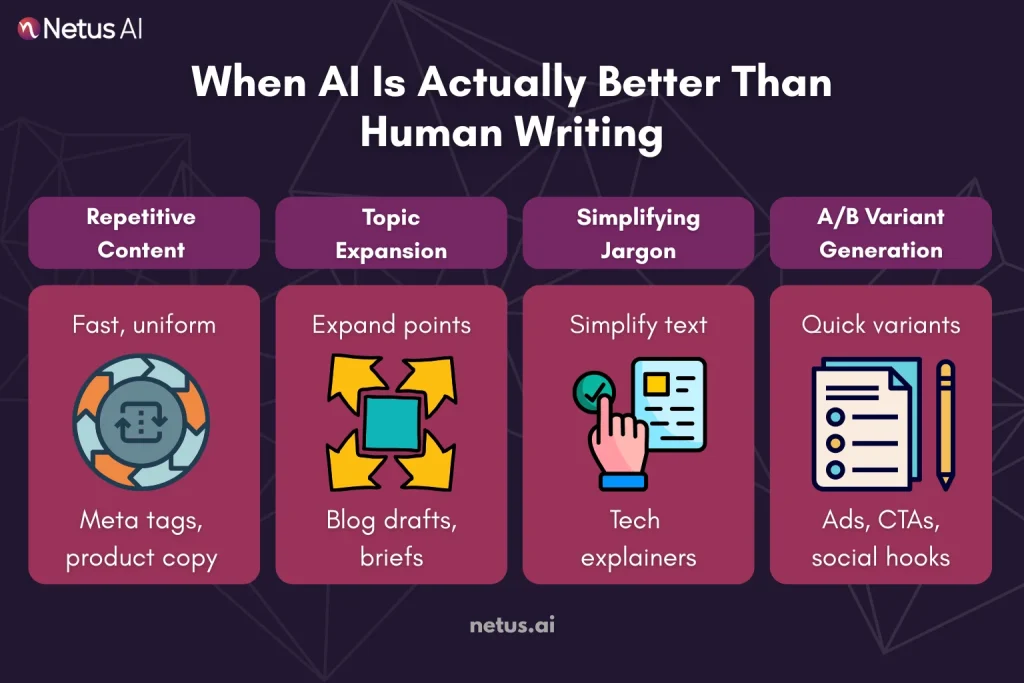
AI offers clear advantages where human creativity in storytelling and nuanced voice isn’t paramount.
Repetitive, Data-Driven Content
Need 100 product descriptions or SEO meta tags written with consistent formatting and tone? AI shines here. It delivers speed, structure and scale.
Topic Expansion
Stuck with a short idea? AI assists content strategists by outlining, generating supporting points and suggesting angles.
Translating Complex Jargon
AI simplifies complex content for wider audiences.
A/B Variants for Testing
When testing calls-to-action, ad copy or social hooks, AI gives you fast variants to choose from, which human writers can then refine.
SEO, Consistency and Content at Scale, Where AI Wins Again
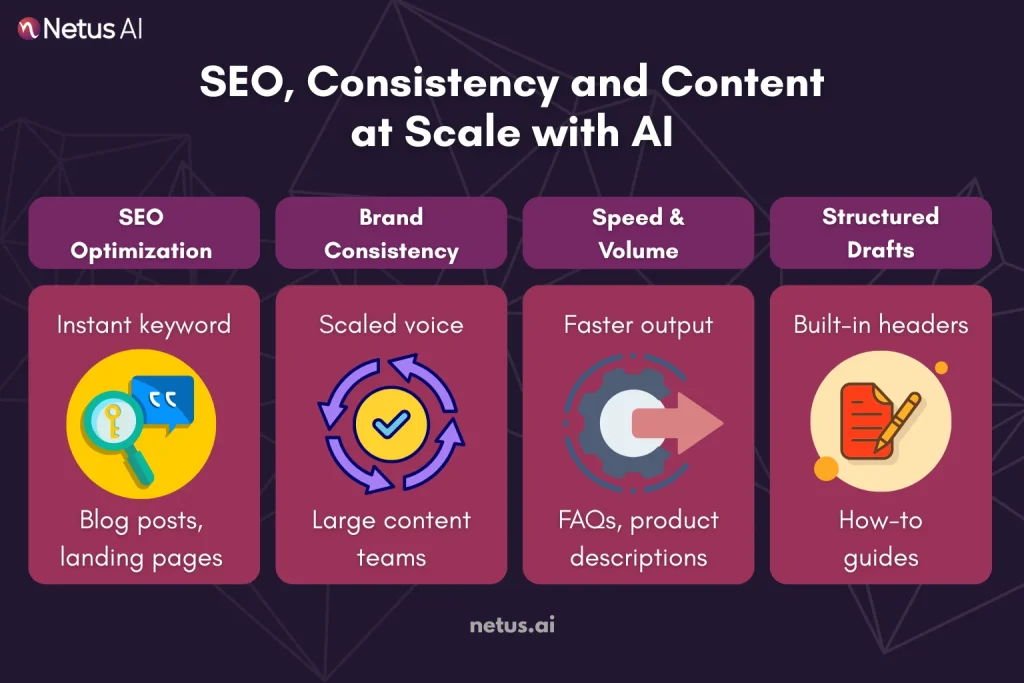
AI shines when the content goal is clarity, structure and scale, especially in high-volume publishing environments.
Optimized for SEO
AI writing tools integrate keywords, semantic variations and on-page SEO, helping posts rank faster with less effort.
Content Consistency
Maintaining brand tone and messaging across dozens (or hundreds) of posts is hard for teams. AI helps enforce structure, voice and formatting guidelines at scale.
Speed + Output
AI efficiently handles templated content like product descriptions, how-tos and FAQs, saving time without losing accuracy.
Built-In Structure
AI-generated drafts are excellent starting points for structured content requiring headers, bullet points and formatting.
The Smartest Strategy: Human x AI Collaboration

The real power of content today doesn’t come from choosing between AI and human writing, it comes from combining both.
Let AI Draft, You Refine
AI speeds up the process, generating structure, ideas or first drafts. But the human touch is what elevates those drafts into something authentic and engaging.
Add context, inject tone, share real-life examples, this is where human insight makes AI-generated content valuable.
Use AI Where It Excels
Let AI do the heavy lifting on keyword mapping, formatting and content scaling. For example:
- Outlines for listicles
- FAQs for landing pages
- SEO-optimized intros and CTAs
Keep Final Ownership
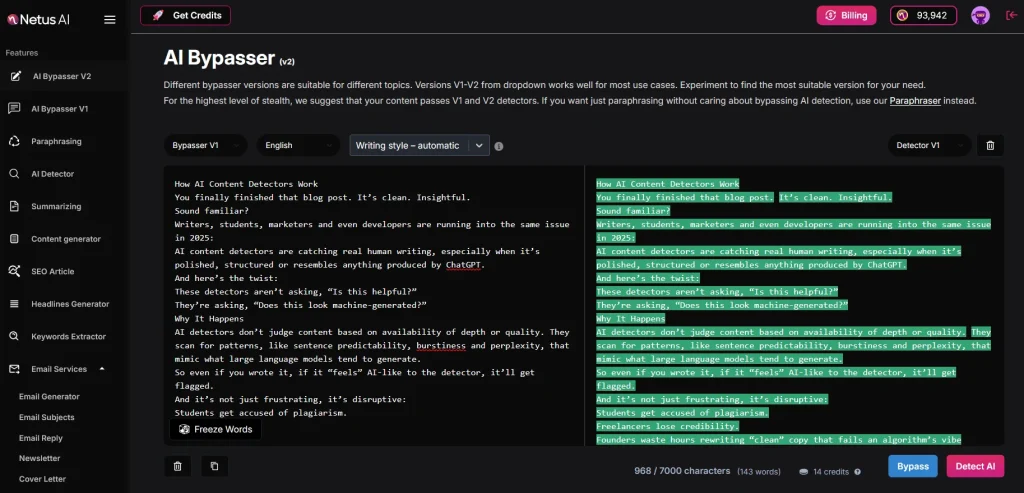
The best content sounds like you, not like a model. That’s why refining the AI output with your own voice, style and examples is key.
NetusAI supports this collaboration model by letting writers:
- Start with AI-generated input
- Rewrite it using AI bypasser tools
- Run real-time detection to ensure it reads naturally
It’s not about hiding AI, it’s about rewriting smart, publishing confidently and keeping your message yours.
Where Netus Fits In: Creating Smarter First Drafts?
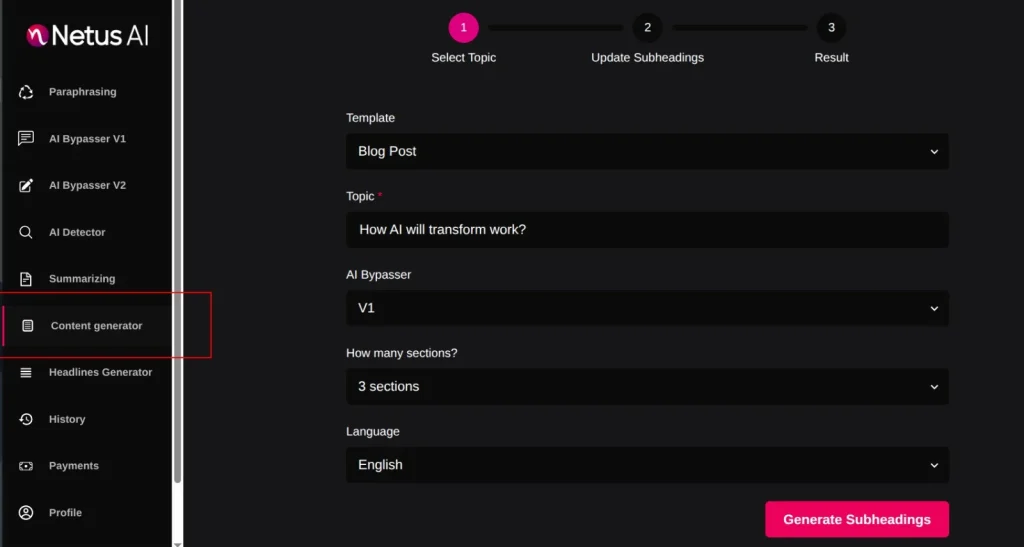
Many struggle with AI blog writing during the drafting phase, not due to lack of ideas but the need for a flexible starting point.
That’s where the Netus Content Generator quietly changes the game.
Create Original Content with Bypass Built In
Netus creates structured, plagiarism-free drafts that bypass AI detectors, unlike generic AI writers. You choose:
- Content type (e.g., blog, essay)
- Bypass engine
- Number of sections
- Language
It gives you a high-quality foundation, not a final draft but something that gets 80% of the structure and tone right.
Built for Refinement, Not Repetition
What makes Netus different is that it doesn’t force you into AI-sounding loops. AI content is plagiarism-free, passes detection and allows time for edits, examples or adding your unique tone.
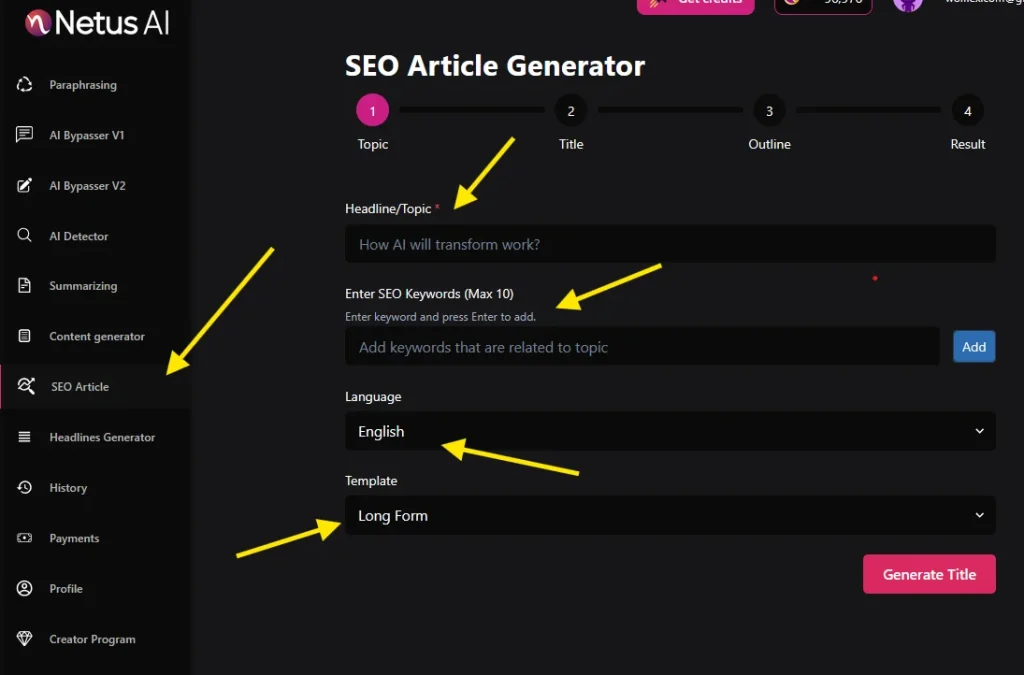
The NetusAI SEO Article Generator helps create optimized, full-length blog posts. Unlike generic tools, it goes beyond simple drafting. It:
It supports headlines, targeted SEO keywords, long-form templates and automatically generates a Title → Outline → Content structure. It also works in multiple languages.
Crucially, it integrates with Netus AI Bypasser + Detector, ensuring your output is readable and bypasses detection.
You can generate, review and rewrite all in one interface without needing third-party tools to patch the gaps. It’s built for marketers, freelancers and bloggers who want their AI content to actually pass as human-written.
Final Thoughts
The question isn’t if you should use AI for blog posts but how. AI speeds up content creation, from brainstorming to drafting. However, unrefined AI content can be bland, generic or flagged, failing to resonate or rank.
Use AI as a collaborative tool to speed up content creation while maintaining your unique voice and SEO.
NetusAI helps you manage AI-generated content, from drafts to SEO, by letting you guide the style and strategy while AI does the work.
In the end, the best blog posts aren’t written by AI, they’re shaped by you, with a little help from smarter tools.
FAQs
1. Is it okay to use AI to write blog posts?
Yes, use AI for blog posts but don’t rely on it blindly. It aids outlines, ideation and drafts but human editing, rewriting and insights are vital for quality, SEO and engagement.
2. Will Google penalize me for using AI-generated content?
Google doesn’t penalize AI-assisted content unless it’s low-value, spammy or overly templated. Helpful, original and humanized posts can rank, even if AI was involved.
3. What’s the difference between AI writing and humanized AI writing?
AI writing is often predictable; humanized AI writing adds variety, tone and nuance while maintaining structure. Netus is one such tool.
4. Are AI content detectors accurate?
AI detectors are improving but can still flag human writing, especially if it’s “too clean.” Tools like NetusAI, offering both detection and rewriting, provide better control.
5. Can clients or readers tell if a blog was written by AI?
Yes, sometimes. Repetitive structure, dull intros and a lack of opinion signal AI-generated content. Humanizing content, manually or with a tool like Netus, can remove these tells.
6. Are free AI writing tools safe for professional blogging?
AI tools can help with quick drafts but they often lack nuance. Paid tools like NetusAI provide a complete solution, including generation, detection, rewriting and paraphrasing.

